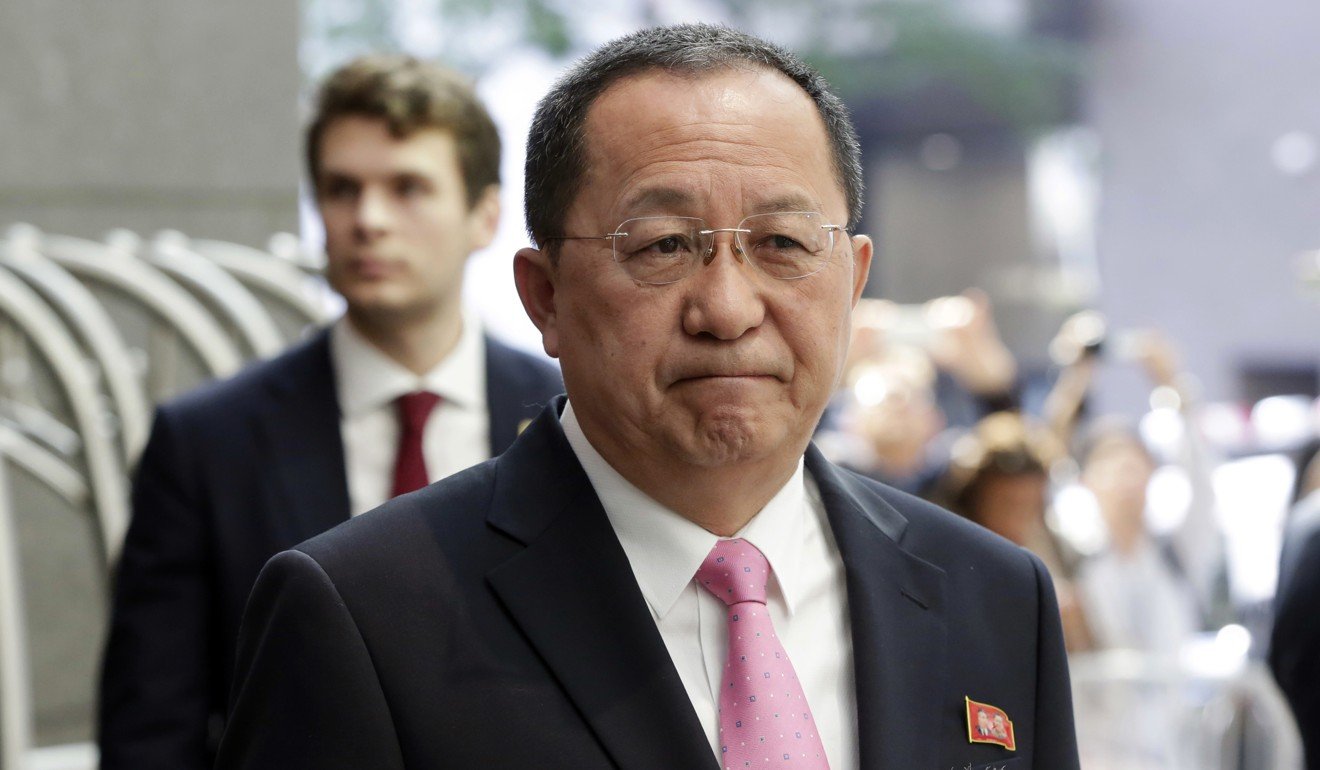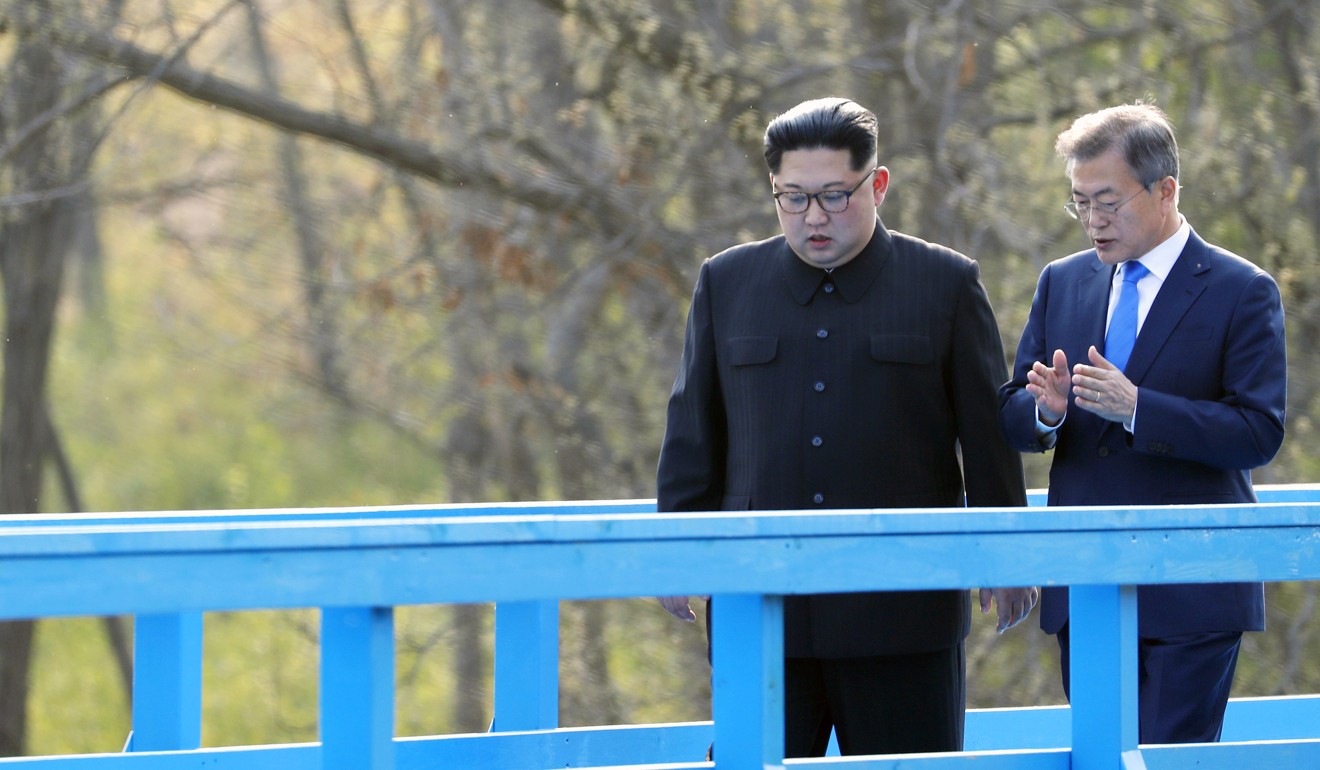
Chinese foreign minister Wang Yi’s North Korea visit ‘could make case for four-party talks on peninsula’
Foreign minister Wang Yi may seek clarification of vow by North and South to ‘end war by trilateral or quadrilateral talks’ as China eyes seat at table
China’s foreign minister will travel to North Korea on Wednesday in the first such visit since 2007, which analysts say may show Beijing’s desire to join the next stage of talks involving the two Koreas and the United States.
Wang Yi’s trip will come ahead of a planned meeting between US President Donald Trump and North Korean leader Kim Jong-un.
Foreign ministry spokesman Lu Kang said in a statement on Monday that Wang would visit on Wednesday and Thursday at the invitation of his North Korean counterpart Ri Yong-ho.
China is the North’s only major economic partner, but trade has declined by about 90 per cent since Beijing’s enactment of economic sanctions imposed over Pyongyang’s nuclear bomb and ballistic missile tests.
In March, Kim made his first visit to Beijing since taking power in 2011, kicking off a flurry of diplomacy culminating in his meeting with South Korean President Moon Jae-in last week.
South Korean officials said that Kim had told Moon he would be willing to give up his nuclear weapons if the US committed to a formal end to the Korean war and pledged not to attack the North.
Kim also promised to shut the North’s nuclear test site in May and disclose the process to specialists and journalists from South Korea and the United States, Seoul’s presidential office said.
China has backed a series of United Nations sanctions against Pyongyang over its nuclear weapons programme, but Beijing is likely to want to avoid being marginalised in the diplomatic activity.

In recent years, Beijing has relied more on its Communist Party’s diplomatic channels to engage Pyongyang. Wang’s immediate superior, Politburo member Yang Jiechi, visited North Korea in 2007 when he was the foreign minister.
Zhao Tong, a fellow on the nuclear policy programme at the Carnegie-Tsinghua Centre for Global Policy in Beijing, said that Wang’s visit might be evidence of China’s strong will to be involved in future talks on the Korean peninsula.
Song Tao, head of the party’s International Department, visited Pyongyang earlier in April, a further sign of improving ties between Beijing and Pyongyang after Kim’s landmark visit to the Chinese capital in March.
Wang’s visit, Zhao said, “appears to be a higher level of meeting than Song’s and carries a meaning of greater importance.
“China would be interested to know what the two Koreas meant by their vow on Friday to ‘work together to officially end the Korean war through trilateral talks or quadrilateral talks’.
“China may be concerned that it might get a seat at the table only after talks between the two Koreas and the US.
“Wang may persuade Pyongyang to act regarding quadrilateral talks, making sure Beijing is involved in the forthcoming peace talks.”
In addition, Wang may express Beijing’s wish to take part in future nuclear inspections in North Korea, Zhao said.
“China is a legitimate nuclear state and it would make sense for Beijing to observe the inspection or the dismantlement process of Pyongyang’s nuclear programme,” he said.
“This would ensure China’s position as a legitimate player in denuclearisation.”
Paik Hak-soon, a director of the Centre for North Korean Studies at the Sejong Institute in Seoul, agreed that Wang might reinforce the case for China’s involvement in further talks.
“During the inter-Korean summit in 2007, it was Pyongyang, not Seoul, that actually preferred three-party talks over four-party talks,” Paik said.
“It would be correct to say Beijing is concerned that it might be overlooked.”
However, Paik disagreed with the possibility that China would be overlooked during the peace talks process on the peninsula.
“We must look at the wider picture,” Paik said. “The phrase ‘overlooking China’ may be correct if you look at the present situation only, but is incorrect if you look at the bigger picture politically in the region.
“Geopolitically, China has positioned itself to play a pivotal role in the future [for the settlement of permanent peace on the Korean peninsula].”

Bonnie Glaser, a China specialist at the Washington-based Centre for Strategic and International Studies, said that being left out of peace talks would be unacceptable to Beijing.
“The Chinese want to ensure that they are at the table and have the means to influence the course of events on the peninsula,” Glaser said.
“China is undoubtedly eager to hear what Kim’s plan is for his meeting with Donald Trump.”
It has been proposed repeatedly by China that the North suspend its nuclear and missile tests in return for the US, Japan and South Korea halting regional military drills.
Although Kim has offered to suspend the tests, he has made no public mention of any demand for the US and its allies to halt military manoeuvres.
“Kim has said nothing about the eventual removal of US troops from Korea, which is almost certainly what China hopes for,” Glaser said.
“Beijing is probably irritated that Kim has ignored China’s ‘freeze for freeze’ proposal [that the US and South Korea halt major military exercises in exchange for North Korea doing the same].”
Zhao said Wang might also seek to improve the political relationship with Pyongyang.
Kim has invited Xi to visit Pyongyang, but with no date set for this yet.
Both Glaser and Paik expected Wang’s visit to help establish the agenda for Xi’s trip. .
Additional reporting by Agence France-Presse and Associated Press

